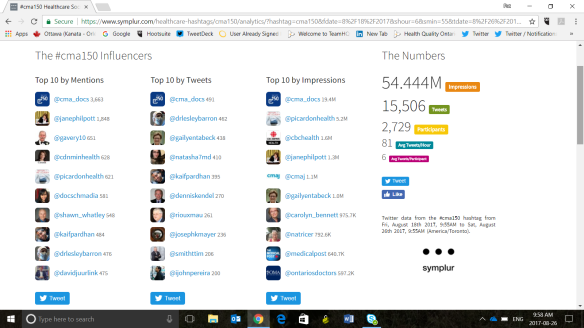
The Canadian Medical Association (CMA) celebrated its 150th anniversary in Quebec City by moving boldly into the 21st century in terms of the organization’s use of social media and digital communications.
The CMA has always attempted to keep up with communications trends and many years ago designated a Twitter hashtag to the meeting (#CMA150 this year) as well as making live broadcasts of most sessions at the meeting available online for some time.
This is in keeping with the ethos of the volunteer, national organization which represents more than 80,000 doctors. At the very first meeting in 1867 (the same year as the birth of Canada), delegates noted the media had been excluded from the meeting and were quick to invite them to attend. Ever since – even on issues as heated as abortion or medical assistance in dying – the meetings have been open to the media.
But this year represents somewhat of a seismic shift for the CMA in line with a fundamental re-think of how the annual General Council meeting can remain relevant. Interestingly it came at the same time as delegates tackled head-on issues of “incivility” that have marked interactions between some of Canada’s doctors on Twitter and Facebook.
Not surprisingly, the meeting was heavily tweeted (graphic courtesy of Symplur). While only a small minority of Canadian physicians use Twitter professionally many of these were in attendance at the meeting.

But this Twitter activity was accompanied for the first time by live discussions of the most important topics on both Periscope and Facebook live. In fact, a discussion of senior’s care issues with Federal Health Minister Dr. Jane Philpott was driven by questions from those who follow the CMA’s Facebook page.
Discussion in the Council chambers was also informed by questions from doctors participating via a conference app – another first for the CMA. This app was heavily promoted both as a way of participating during the meeting but also as an opportunity to continue the discussion on various topics after the meeting concluded.
The discussion of physician’s improper use of social media to attack colleagues was the subject of a panel discussion nested within a broader debate about developing a first professional code of conduct and professionalism for Canadian doctors. Examples of such conduct were available even in the days leading up to the meeting.

Those who had been challenged on social media appeared willing to forgive their colleagues and attribute the negative comments to the excessive stresses and challenges facing doctors in Canada today. But what many might consider unprofessional conduct on Twitter continued even during CMA’s meeting and was commented on by the Speaker for the meeting.
While CMA’s has always been seen as the foremost national advocate for doctors and indirectly the interest of patients, its latest strategic plan puts an emphasis on being “patient-centred” and there is even discussion of considering putting patients on the CMA Board of Directors.
Quebec City is where the CMA began but this year demonstrated that the organization was definitely not planning its future by looking back.
